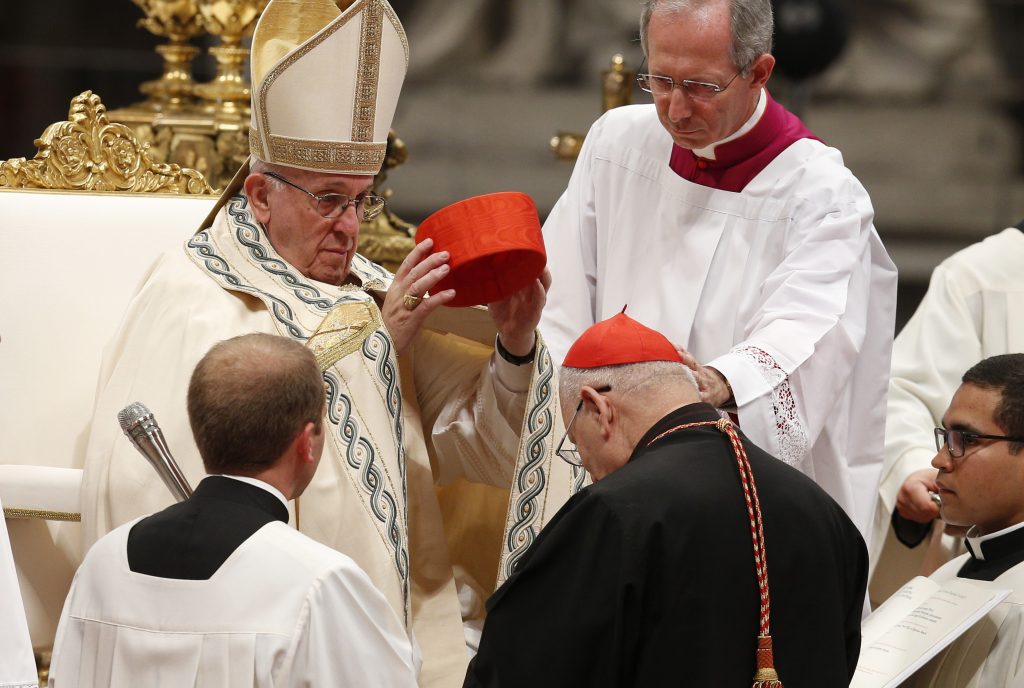ROME — Few things have a broader impact on a pontificate’s long-term direction than the naming of personnel. On June 28, Pope Francis continued to establish his imprint on the college of cardinals — arguably the most relevant personnel of them all, since it’s from this exclusive club that the next pope will be elected.
Speaking to them on Thursday, the pope asked the 14 new cardinals created in this year’s consistory to not waste their time being involved in palace intrigue, and focus instead on serving Christ and his Church.
“What does it profit us to gain the whole world if we are corroded within?” he asked. “What does it profit us to gain the whole world if we are living in a stifling atmosphere of intrigues that dry up our hearts and impede our mission?”
“Here, as someone has observed, we might think of all those palace intrigues that take place, even in curial offices,” Pope Francis continued in his remarks, delivered at a solemn ceremony that took place in the majestic scenery of St. Peter’s Basilica in Rome.
He placed the “red hats” on 14 men, 11 of whom were younger than 80 and would thus be able to participate in the next conclave to choose the successor of the first pope from the global South.
The formula for the creation of new cardinals, in many ways, summarizes what took place in a basilica that had a standing-room-only crowd.
“It chiefly concerns the Church of Rome, but it also affects the entire ecclesial community: we will call certain of our brethren to enter the College of Cardinals, so that they may be united to the Chair of Peter by a closer bond to our apostolic ministry,” the pope said.
“Having been invested with the sacred purple, they are to be fearless witnesses to Christ and his gospel in the City of Rome and in faraway regions,” the formula says.
The new cardinals come from 11 countries: Iraq, Pakistan, Portugal, Italy, Spain, Madagascar, Mexico, Bolivia, Peru, Japan and Poland, though some are based in Rome, working in the Vatican.
These include new cardinals Luis Francisco Ladaria Ferrer, a Spaniard, who for the past year has been the head of the Congregation for the Doctrine of the Faith; and Konrad Krajewski, Polish, the almoner of the Office of Papal Charities, often dubbed the pope’s “charitable hand.”
“Jesus teaches us that conversion, change of heart and Church reform is and ever shall be in a missionary key, which demands an end to looking out for and protecting our own interests, in order to look out for and protect those of the Father,” Pope Francis said.
“Conversion from our sins and from selfishness will never be an end in itself, but it’s always a means of growing in fidelity and willingness to embrace the mission,” he added.
In his homily, Pope Francis challenged the new cardinals to focus their activities and their energies on the needs of “real people” in order to provide a credible witness to the Gospel.
“This is the highest honor that we can receive, the greatest promotion that can be awarded us: to serve Christ in God’s faithful people. In those who are hungry, neglected, imprisoned, sick, suffering, addicted to drugs, cast aside.”
During the week, some of the new cardinals spoke to the press in informal encounters facilitated by the Vatican Press Office. Among them was Iraqi Patriarch Raphael Sako of the Chaldean Catholic Church, who said his birretta was an encouragement for the beleaguered Christian community of Iraq.
Despite the relevance it has for the faithful in Iraq, however, he said that becoming a cardinal changes “nothing” for him, and that he will continue to be a pastor, “not a prince.”
“As the pope says, we’re servants, we must serve our people freely and with joy,” he said, adding that his nomination is an “encouragement for Christians, but also a support of Iraq.”
Patriarch Sako was the first new cardinal named by Pope Francis back on Pentecost Sunday, when he announced the consistory. As such, it was the Chaldean’s task to address the pontiff during the consistory.
During his remarks, the prelate said that it’s not a reward nor an honor, but an invitation to “mission with the red dress that means giving life until the end, until the blood is gone, bringing the joy of the gospel to everyone.”
“Your paternal call for us is an encouragement in our sufferings and gives us the hope that the current storm will pass and it will be possible to live together harmoniously,” he said. “I firmly believe in the fruitfulness of love propelled all the way to the end. This martyr’s blood is not for nothing.”
The patriarch — who received a hat different than the three-cornered biretta of the Latin-rite bishops — also expressed to the pontiff the new cardinals’ support to redouble the efforts to promote cooperation and a culture of dialogue, together with respect and peace, particularly where it’s all the more needed: Iraq, “Land of Abraham,” in Syria, Palestine and the Middle East as a whole.
On Friday, June 29, the feast of Sts. Peter and Paul, the new cardinals concelebrated Mass with Pope Francis, where he told the cardinals and a group of 30 newly appointed archbishops that loving God means abandoning any illusions of prestige.
Jesus “kept bringing the father’s love and mercy to the very end,” the pope said. “This merciful love demands that we, too, go forth to every corner of life, to reach out to everyone, even though this may cost us our ‘good name,’ our comforts, our status … even martyrdom.”


